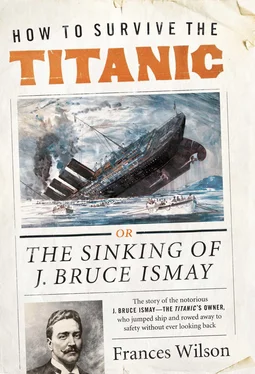Lightoller later wrote in his memoirs: ‘The Board of Trade had passed that ship as in all respects fit for sea, in every sense of the word, with sufficient margin for everyone on board. Now the Board of Trade was holding an inquiry into the loss of that ship — hence the whitewash brush.’ 2It was not only the public who had little confidence in Mersey as an impartial assessor. The Bradford and District Trades and Labour Council sent the Home Office a resolution of ‘no confidence in the Court of Inquiry’. It was, they concluded, ‘an attempt… to whitewash those who are the most responsible for the terrible loss of human life’. 3When it was over, the British Seafarers’ Union announced that ‘the Whitewashing “Titanic” inquiry has cost the nation £20,231… It will be seen that the lawyers take between them just on £13,000… The ruling classes rob and plunder the people all the time, and the Inquiry has shown that they have no scruples in taking advantage of death and disaster.’ As far as Conrad was concerned, Lord Mersey could be taken no more seriously than the Mikado’s ridiculous Grand Pooh-Bah, who was First Lord of the Treasury, Lord Chief Justice, Commander-in-Chief, Lord High Admiral, Archbishop of Titipu, Lord Mayor, and Lord High Everything Else.
The response of the British press to the wreck of the Titanic had been to celebrate Britishness rather than allocate blame. Several papers commented on the analogy between the heroism and discipline of the men on the Titanic and those on the Birkenhead, and on the alleged fact that musicians were performing as each ship went down. The two journalists who produced the first book-length accounts of the wreck agreed that this was to be a story without a villain, a narrative decision which left the behaviour of Ismay problematic. Filson Young’s Titanic, a work of high Romanticism and the first recorded instant book, appeared in the shops on 22 May. Young declared that ‘there is nothing so entirely dignified, as to be silent and quiet in the face of an approaching horror’, adding of Ismay, with Marlow-like empathy, that he carried his cross with the stoicism of an Englishman: ‘he bore on his shoulders the burden of every sufferer’s grief and loss, and he bore it, not with shame, for he had no cause for shame, but with reticence of words and activity… and with a dignity which was proof against even the bitter injustice of which he was the victim in the days that followed’. 4In ‘The Deathless Story of the Titanic’, published by Lloyd’s Weekly News two weeks after the wreck, Philip Gibbs came up with the phrase: ‘Yet greater than tragedy is the glory.’ The British felt more anger towards Senator Smith than they did towards Bruce Ismay, but the general mood was one of sorrow. ‘Slowly, with infinite reproach,’ wrote the Daily Mirror, ‘the whole world turns towards those responsible and asks them, why ? There is no tone of vulgar recrimination, no calling of names and bringing up of useless bitterness in this gesture. It is simply the sorrowful turning of all those who sympathise towards those who might know, followed by their breathless question: Why?’
The British inquiry divided this overwhelming question into twenty-six specific areas, to which 25,622 answers were given by ninety-four different witnesses. They covered the issue of safety provision, the arrangements for the manning and launching of boats, the route taken by the ship, her speed at the time of the collision, the cause of her foundering, and the number and class of her survivors. The inquiry would focus its energies on the role of the Marconigram given to Ismay by Captain Smith, but nothing was asked about the origin of the messages which had reassured the world that the Titanic and her passengers were safe, a mystery which was currently occupying Senator Smith in New York, or the ‘Yamsi’ messages which suggested that Ismay was trying to escape the US inquiry. None of Lord Mersey’s questions directly addressed the issue which would became the dominant concern of the inquiry, the thread on which the entire proceedings were strung: what was Ismay’s status on board the ship?
Senator Smith’s report into the findings of the US Senate Committee, in which he concluded that the presence of Ismay had ‘unconsciously stimulated’ the Captain to increase his speed, was published on 28 May. ‘We shall leave it to the honest judgement of England,’ Smith concluded, ‘in its painstaking chastisement of the British Board of Trade, to whose laxity of regulation and hasty inspection the world is largely indebted for this awful fatality.’ Meanwhile, the only interruption to the greyness of the British Board of Trade’s proceedings had been the appearance, on 20 May, of the glamorous Duff Gordons. Lord Duff Gordon had been accused of paying the seven crew members in his otherwise empty lifeboat not to return to pick up any of the bodies in the water. Two German princes, the Russian Ambassador, Margot Asquith, and a group of the Titanic ’s stewardesses dressed in black turned up to hear him try to clear his name.
The Duff Gordons were followed to the witness stand that day by Lightoller, at which point the spectators drifted back out to feed the ducks in St James’s Park. Lightoller, who would answer 1,600 questions during fifty hours of interrogation, spoke with his usual fluency and his description of the ‘extraordinary combination of circumstances, which you would not meet again once in 100 years’, made a decisive impact on Lord Mersey. On the night of 14 April, Lightoller said, ‘everything was against us… In the first place, there was no moon; then there was no wind, not the slightest breath of air. And most particular of all in my estimation is the fact, a most extraordinary circumstance, that there was not any swell. Had there been the slightest degree of swell I have no doubt that berg would have been seen in plenty of time to clear it.’ It was a magnificent description, so magnificent that Lightoller later used it again in his memoirs. ‘The disaster’, he then wrote, ‘was due to a combination of circumstances that had never occurred before and would never occur again.’ It was language worthy of Conrad, who described the conditions of sea and sky on the night that the Patna had her accident as ‘rare enough to resemble a special arrangement of malevolent providence’. Lightoller led his audience in the Drill Hall by the wrist into the uncanny world of the ancient mariner, who had killed the bird who brought the breeze. In Coleridge’s mesmerising ballad, ‘ice mast-high came floating by/ As green as Emerald’, before the ship finds itself stuck on a ‘silent sea’, without ‘breath nor motion,/ As idle as a painted ship/ Upon a painted ocean’. ‘Wait a minute,’ said Mersey, when Lightoller had finished his account of the climatic conditions. ‘No moon, no wind, no swell? The moon we knew of, the wind we knew of, but the absence of swell we did not know of. You naturally conclude that you do not meet with a sea like it was, like a table-top or a floor, a most extraordinary circumstance, and I guarantee that 99 men out of 100 could never call to mind actual proof of there having been such an absolutely smooth sea.’
Lightoller was asked nothing about Ismay, other than whether he had seen him on board the ship. Nor was anything asked about the meetings between the two men in the doctor’s cabin on the Carpathia. The relationship between Lightoller and Ismay, which had been of such interest to Senator Smith, was of no interest at all to the British inquiry, who were concerned only with the question of speed, visibility, and the role the Second Officer had played during the lowering of the lifeboats. Lightoller handled, he later said, ‘sharp questions that needed careful answers if one was to avoid a pitfall, carefully and subtly dug, leading to a pinning down of blame onto someone’s luckless shoulders’. Those shoulders, which had been luckless Yamsi’s in America, were now, Lightoller believed, his. On this occasion he did not mock the court. Lightoller took his inquisition seriously. He ducked and dived and dodged the ‘cleverest legal minds in England, striving tooth and nail to prove the inadequacy here, the lack there, when one had known, full well, and for many years, the ever-present possibility of just such a disaster’. He was proud of his performance, which he called a ‘long drawn out battle of wits’, and he was keen afterwards to let it be known that he held ‘the unenviable position of whipping boy’ for the White Star Line. He defended the company from the accusation that the ship was undermanned when it came to launching the lifeboats; he stated that it was common practice not to slow down in ice regions; if it was considered reckless to head into an ice field at full speed, Lightoller said, then ‘recklessness applies to practically every commander and every ship crossing the Atlantic Ocean’.
Читать дальше












